European Standards of Care for Newborn Health
Europe needs new ideas and solutions to address the disparities in the care of preterm and ill babies. The European Standards of Care for Newborn Health project presents such a solution by providing European reference standards for this health care area.
With its transdisciplinary focus and international composition of the working groups, the project sets new benchmarks for the care of preterm and newborn babies and can serve as a role model for countries in Europe and worldwide. About 220 experts from more than 30 countries accepted to dedicate their free time to work on this ambitious project over several years. At the time of the launch of the standards, 108 healthcare societies and associations as well as 50 parent organisations have accepted EFCNI’s invitation to officially support the newly developed standards.
Through its multi-stakeholder approach, the perspective of parents, healthcare professionals, and relevant third parties were equally considered, aiming at identifying current best practice. Industry partners were involved in the project by supporting it financially. Their representatives could join the Chair Committee meetings in an observing role and they were welcome to share their knowledge and expertise without exerting influence. Initiated by patient (parent) representatives for patients, it is a true patient-centred project and, for the first time, patients were involved in absolutely every step in the development of the standards. All project participants work together in an open and respectful partnership to pave the way for change and set newborn health on the international and national agendas.
On a political level, addressing European Standards of Care for Newborn Health will stimulate a new debate that can help questioning existing structures, identify gaps and deficiencies, and advance national healthcare systems. To read the standards and to learn more about their development, please visit our project website European Standards of Care for Newborn Health.
On the project website, you also find further information like a project report, an information brochure or social media graphics.
The European Standards of Care for Newborn Health now available in Italian – Gli Standard Assistenziali Europei per la Salute del Neonato sono disponibili in italiano
The Italian Society of Neonatology (SIN) and Vivere ONLUS, the Italian National Coordination of Parents’ Associations, took the initiative to translate the standards into Italian, with Italy becoming the first European country to make this important document available in their national language. The first two sets of standards can be downloaded from our project page.
Call to Action for Newborn Health in Europe
The UN Convention on the Rights of the Child has been ratified by 196 countries and proclaims that “the child, by reason of his physical and mental immaturity, needs special safeguards and care, including appropriate legal protection, before as well as after birth”. Article 6 affirms every child has the right to life, survival, and development. Furthermore, children have a right to be cared for by their parents and should not be separated from them, as far as possible (Articles 7 and 9). However, upholding the Rights of the Child in reality remains a major challenge.
The European Standards of Care for Newborn Health help support these rights from the beginning of life by serving as a reference for the development and implementation of binding standards and guidelines on a national and international level. European and national policy makers, hospital administrators, insurers, professional and patient associations, and industry should work together to bring the standards into practice and to ensure quality, equity, and dignity for the smallest.
Therefore, we call for action to:

Identify women at risk for preterm birth early and avoid transfers that result in increased morbidity and mortality and the separation of mother and baby by providing treatment in specialised perinatal centres where maternal and newborn care are located together.

Commit to evidence-based healthcare by providing modern health technology and an adequate number of staff. Easily comprehensible information for parents on treatment and care procedures needs to be available all times.

Provide sufficient specialist staff, particularly nurses and midwives, to ensure optimal care for babies.

Support parents of newborn babies in their role as primary caregivers from admission to hospital, promote infant- and family-centred developmental care and ensure parents 24-hour access to their baby.

Follow guidelines and recommendations on clinical environment and interior design to reduce stressful events for the vulnerable baby and provide facilities for parents and families that are sensitive to their needs and allow privacy with their baby.

Make adequate resources available to support optimal nutritional care that meets the baby’s individual needs from the first day of life. Mother’s own milk should always be the first choice and breastfeeding needs to be supported.

Promote shared decision-making between healthcare professionals and parents in ethically challenging situations. This includes providing psycho-social support for both, parents and healthcare professionals throughout the process.

Support coordinated, specialised, and effective follow-up and continuing care services for babies and children at risk for later developmental difficulties, as well as for their families. This provides targeted and evidence-based preventive measures to optimise child health and development as an important basis for the health and well-being of the whole family.

Ensure patient safety and adherence to hygiene practices by providing evidence-based information, equipment, and training for staff, parents, and visitors. This includes creating a blame-free error-reporting culture to improve healthcare quality and prevent adverse effects of care and treatment procedures.

Define and provide national and European-wide comparable datasets on pregnancy, birth, maternal, newborn, and child healthcare from conception into adulthood.

Ensure continuous education and training for all healthcare professionals working in maternal and newborn healthcare, including regularly updated curricula and training in sensitive communication and open interaction with parents.

Establish national frameworks for strategies to minimise risks before, during, and after birth.

Define indicators for long-term health and developmental outcomes and create quality measurement tools to allow benchmarking within and between hospitals and countries.

Support research into maternal and newborn health, develop and implement clinical guidelines and protocols to ensure evidence-based care, reduce mortality and morbidity, and improve quality of life.
Download the Call to Action Brochures
The Call to Action is available in about 20 languages and can be downloaded here.
Landmark in the Land of Ideas

The European Standards of Care for Newborn Health project has been awarded one of the most innovative “Landmarks 2017” of the initiative Germany – Land of Ideas.
View more (website of the initiative, in German)
Image video
Chair Committee Meetings
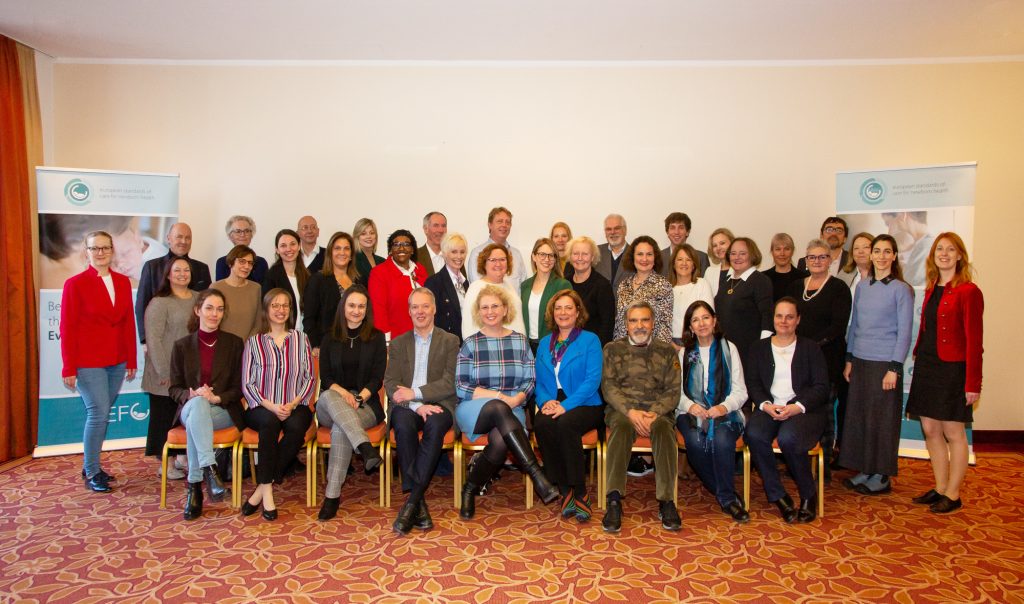
6th Chair Committee Meeting 2023, Freising
From 1 to 3 March 2023, more than 30 experts from 16 countries gathered at the 6th Chair Committee Meeting of the European Standards of Care for Newborn Health (ESCNH) in Freising, Germany.
The focus of this year’s Chair Committee Meeting was the revision process of 76 standards of the ESCNH, which involves a public and an expert consultation for the respective standards, and how to foster the national implementation of the ESCNH.
The next big task for the following years will be the implementation of the standards. In constructive roundtable discussions, the Chair Committee members exchanged views on various implementation activities, including the development of a self-assessment tool for hospitals to evaluate the implementation status of the ESCNH. Our guest speaker Dr Gina Ancora, lead of the Italian implementation Task Force from the Italian Society of Neonatology (SIN), gave an inspiring talk on how the implementation process is planned for Italy.
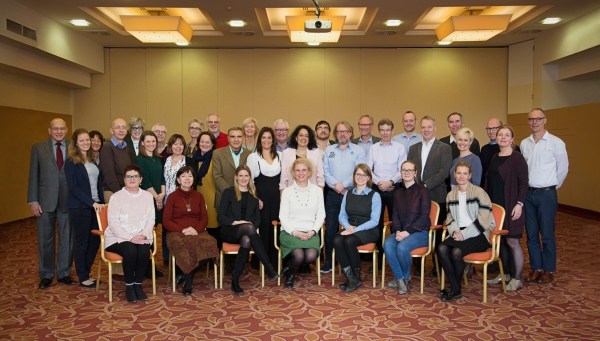
5th Chair Committee Meeting 2018, Freising
The launch of the standards developed within the European Standards of Care for Newborn Health project is continuously getting closer and we have taken another important step towards finalising the standards.
From 25 to 27 February 2018, more than 30 experts from 16 countries gathered at the 5th and final Chair Committee Meeting of the European Standards of Care for Newborn Health project in Freising, Germany. In intense working session, different Chair Committee Groups discussed and firmed up the remaining 60 of the in total approximately 100 standards. The meeting also offered the opportunity to organise the launch of the standards which is scheduled for November 2018 and to prepare the implementation process. Moreover, every Topic Expert Group, responsible for one of the eleven neonatal and perinatal topics, got the chance to present their work of the past four years.
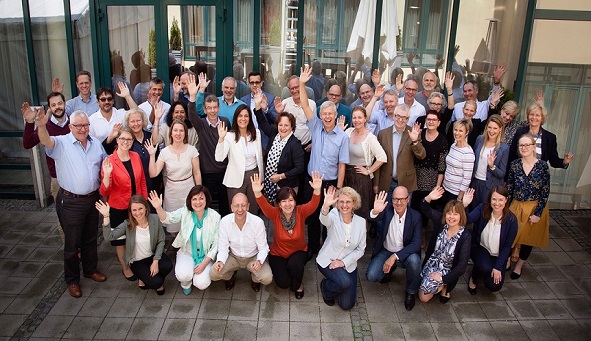
4th Chair Committee Meeting 2017, Freising
More than 40 experts from 17 countries formed a powerful international group at the 4th Chair Committee Meeting of the European Standards of Care for Newborn Health project from 21 to 23 May 2017 in Freising, Germany. In different working groups, they intensively discussed and finalised the first part of the submitted standards in 11 key areas of newborn health.
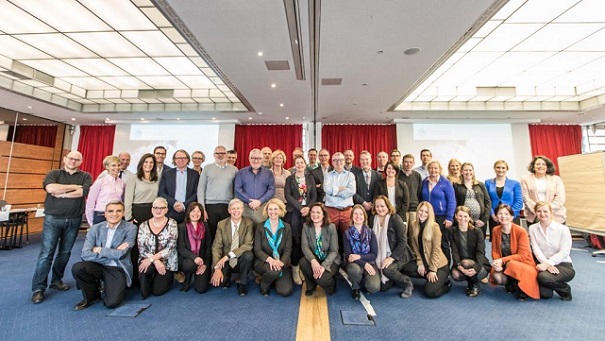
3rd Chair Committee Meeting 2016, Berlin
From 11 to 12 April 2016, the members of the Chair Committee of the European Standards of Care for Newborn Health project came together for the 3rd Chair Committee Meeting in Berlin. The focus of the meeting was the ongoing project work. To that aim, all Chair Teams presented the work of their Topic Expert Groups and all the participants were given a project review and outlook presentations by the EFCNI project team.
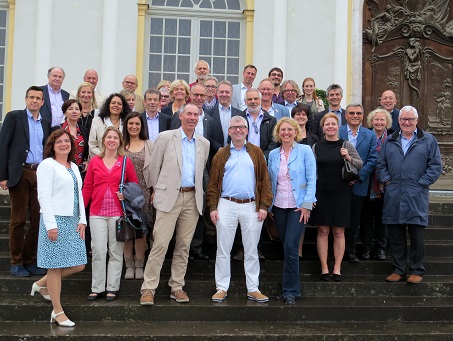
2nd Chair Committee Meeting 2015, Munich
The 2nd Chair Committee meeting of the European Standards of Care for Newborn Health project took place from 15 to 16 June 2015 in Eching, Germany. We are delighted that all members of EFCNI’s Parent Advisory Board as well as the Chairs and Vice Chairs of the project’s working groups could attend the meeting. During the two days of intense work, the project moved an important step forward.
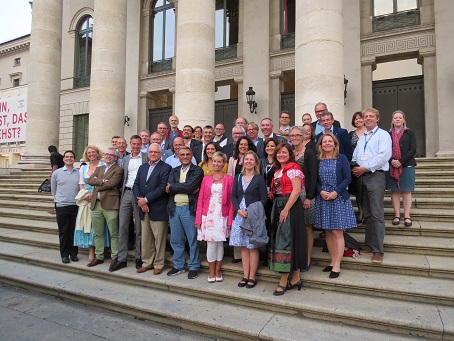
1st Chair Committee Meeting 2014, Munich
On 10 and 11 September 2014 we started our new project to draft European Standards of Care for Newborn Health. 42 participants from all over Europe took part in a journey to enable every baby the best start in life.
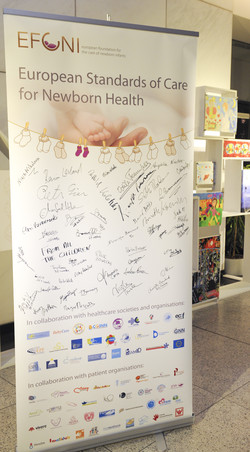
Official start of EFCNI’s European Standards of Care for Newborn Health project
We are very happy and excited about the start of EFCNI’s European Standards of Care for Newborn Health project, EFCNI’s next milestone to tackle inequalities in newborn health in Europe. The official project start was on the occasion of the opening event of the Socks for Life art exhibition in the European Parliament in Brussels on 7 April 2014.
Following the handover of European votes for the Call for Action by former preterm infants to Vice President of the European Parliament Rainer Wieland, the stakeholders present officially declared to collaboratively work on European-wide Standards of Care for Newborn Health. The need for harmonised standards and their development in a collaborative approach have been endorsed by many healthcare societies and parent organisations. All of them have visualised their support with their logo. Visitors of the exhibition could equally show their support through their signature.
The project
This collaborative project under the auspices of EFCNI will bring together health experts, professional societies, civil society organisations, representatives of national parent organisations, third party advisors and industry partners to develop harmonised standards for the care of preterm and newborn infants in Europe. The standards will cover all topics from care at birth, neonatal intensive care as well as follow-up and continuing care to ethical questions, education of neonatal health professionals, data collection and documentation. To this end, interdisciplinary Topic Expert Groups will be dedicated to one topic of newborn health. The standards will run through an extensive consultation process before being publically available online. We are confident that providing a set of expert-developed standards for newborn health will be an important step towards improving the quality of preterm and newborn care in Europe.
A brief review
This project will tie in directly with EFCNI’s previous work against inequalities in maternal and newborn health in Europe.
In 2010, EFCNI published an EU Benchmarking Report ‘Too Little, Too Late’ to help capture for policy makers the impact of prematurity across Europe. This report painted a compelling picture of the differences that exist in levels of care when it comes to maternal and newborn health in Europe. It also began a reflection process amongst parents, medical professionals, academics and industry partners to move from an identification of the various provisions that EU Member States have made for newborn infants, to concrete proposals for improving the standards of care in Europe.
The next milestone was the publication of the EFCNI White Paper on Maternal and Newborn Health in 2011. In this report, healthcare providers from different disciplines and professions as well as parents and professional societies were asked to provide their perspectives on challenges and evidence-based recommendations in the field of pre-conceptional, maternal, newborn care, follow-up and continuing care. As a result of these contributions, a set of key recommendations for each field were developed.
The next logical step is the development of harmonised standards that will incorporate and expand on these key recommendations. This will be achieved by EFCNI’s European Standards of Care for Newborn Health project.
Supporting healthcare societies
We warmly thank the following healthcare societies and organisations for supporting the developed European Standards of Care for Newborn Health and endorsing the Call to Action for Newborn Health in Europe (in alphabetic order):
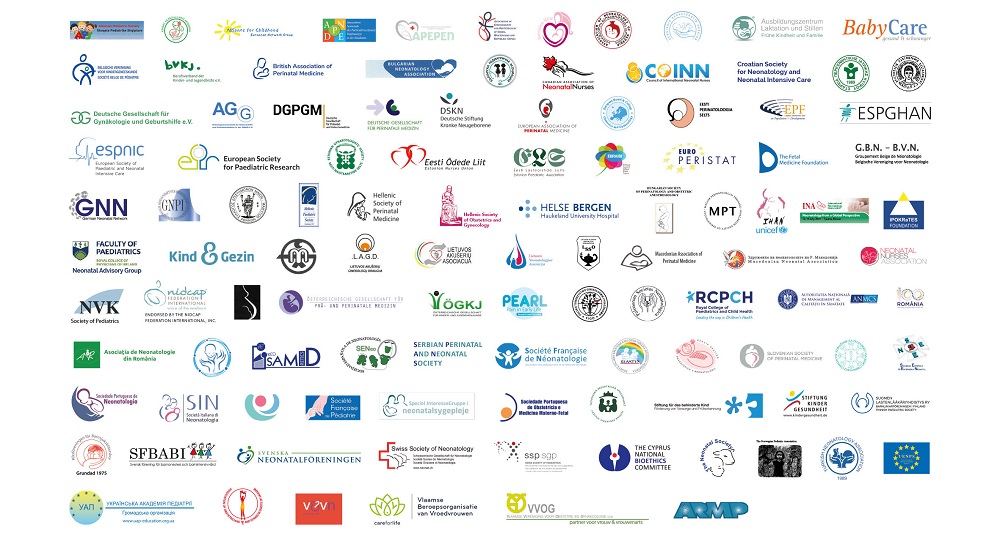
Supporting parent societies
We warmly thank the following parent organisations for supporting the developed European Standards of Care for Newborn Health and endorsing the Call to Action for Newborn Health in Europe (in alphabetic order):
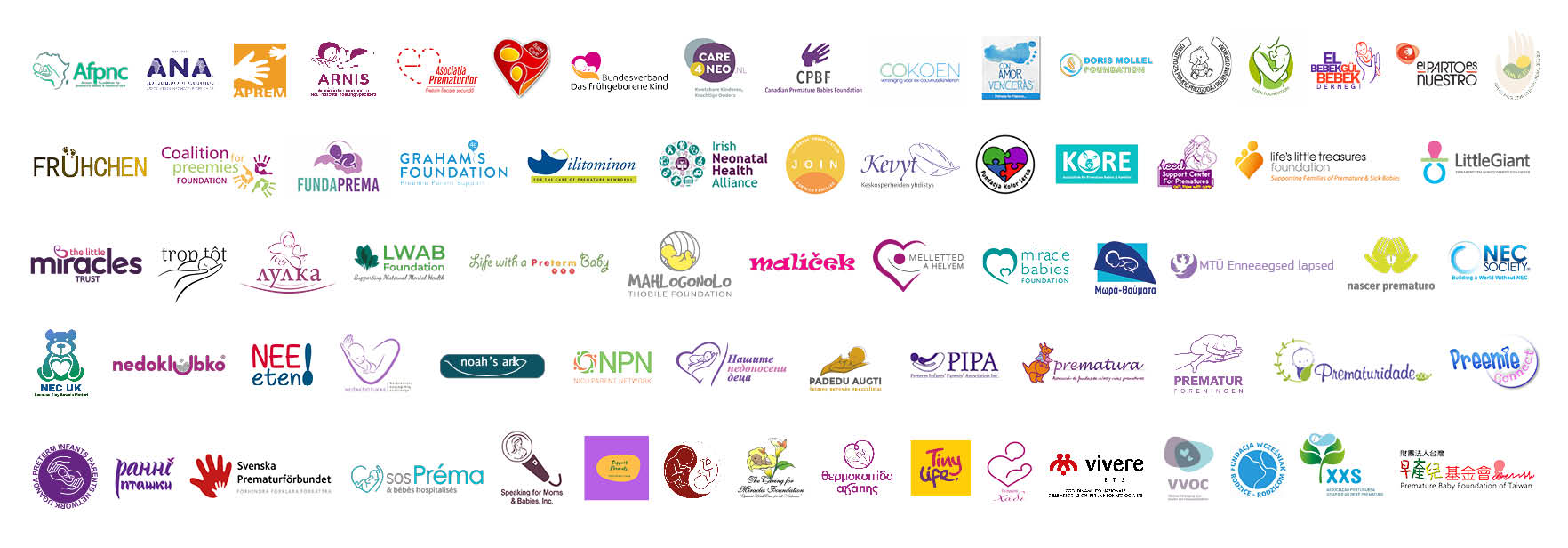
In 2024, the project is kindly supported by Chiesi, Janssen, Nestlé Nutrition Institute, and Sanofi.



